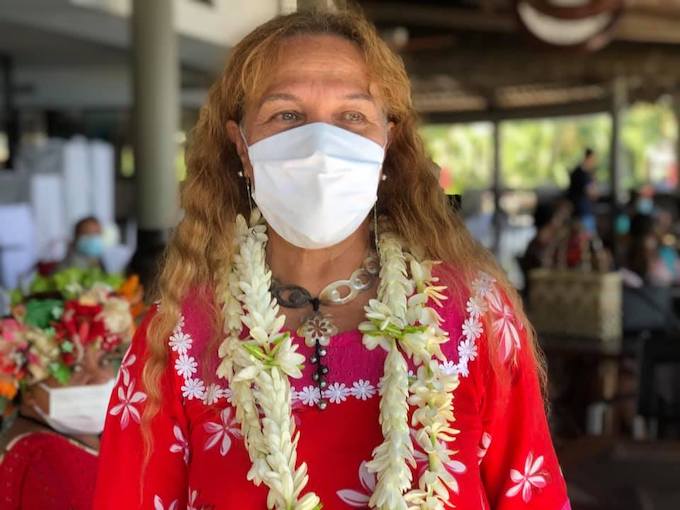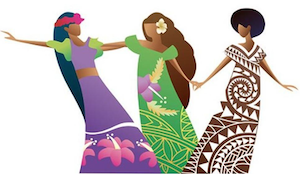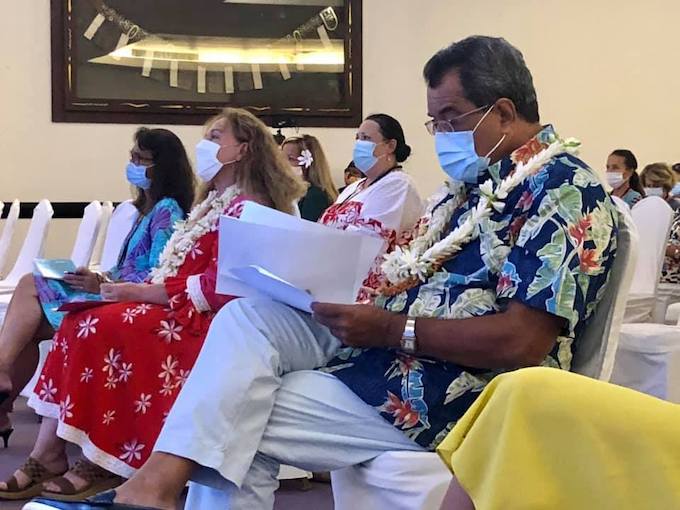
By Josefa Babitu
A French Polynesian territorial government cabinet minister says the pandemic and climate justice have provided an opportunity to think about the progress made about action for women’s empowerment in the Pacific.
Minister for Family, Solidarity and Equal Opportunities Isabelle Sachet has told the three-day 14th Triennial Conference of Pacific Women it was a time to reflect on the implementation of the revised version of the Pacific Platform for Action on Gender Equality.
“Together, we will work towards the total fulfilment of women’s rights, climate justice and women’s empowerment throughout the Pacific Islands region,” she said.

Fiji’s Minister for Women Mereseini Vuniwaqa echoed the sentiments, saying the covid-19 coronavirus crisis had revealed and intensified the “precarious situation” of women and girls.
“A year since the World Health Organisation declared covid-19 a pandemic, life as we knew it has been on pause, changed and transformed while the inequalities we lived with before the pandemic have carried over to the new normal, left unchecked and sadly increased,” she said.
“This is especially in terms of their economic security, physical safety, health and access to decision-making spaces. I firmly believe that we cannot waver.”
Pacific Island countries have made strong commitments towards achieving gender equality and empowerment of women and girls during the conference.
Sustaining the momentum
Organised by the Pacific Community (SPC) and hosted by French Polynesia, the conference is aimed at sustaining the momentum towards gender equality in the Pacific.
The conference has brought together stakeholders from all sectors for high-level discussions and consultations on achievable targets and an action plan to progress gender equality in the region.
Fiji’s Vuniwaqa said the crises, while devastating, could open up opportunities for transformation and bold actions.
She said the conference was for women and girls who faced or were at risk of gender-based violence.
“This work is for all women and girls in the Pacific. Those who carry most of the responsibility for holding our societies together during the pandemic, be it at home, in health care, at school, markets and across all fields,” she said.
Palau’s Vice-President and Minister of State Jerrlyn Sengebau Sr spoke for the Micronesian group comprising Federated States of Micronesia, Guam, Kiribati, Marshall Islands, Nauru and Palau.
“Our Micronesian sub-region has made concerted efforts to advance our collective gender equality agenda,” she said.

‘Agents of change’
“We also acknowledge the significant role of women as active agents of change and their partnership is critical to our work.”
With the theme of the conference Our Ocean, Our Heritage, Our Future – Empowering All Women in the Blue Pacific Continent, Sengebau said their efforts to date reflected the importance of developing their expertise in gender and women’s human rights as well as building capacity to mainstream and integrate gender across government and multisectoral responses to gender issues.
“It is also a key strategy for facilitating gender responsive budgeting through the collective resourcing of our gender equality agenda by all of government – that is the key to realizing political will and commitment at the highest level.”
Funding support for the event was provided by the government of Australia and the Spotlight Initiative.
Australia’s Minister for Foreign Affairs and Minister for Women Marise Payne said the past year had been difficult for the region and those challenges were not diminishing.
“The pandemic has forced us to confront an acute global health threat, border closures, economic insecurities and chronic supply chain interruptions,” she said.
“Every single one of us has been impacted one way or another by COVID-19. Globally, we have seen the industries that traditionally employ women – retail, tourism, the informal market economy – decline.
Disturbing violence increase
“That has distressingly coincided with an increase in both women’s unpaid work care responsibilities and very disturbingly increase in gender-based violence.”
Payne said the pandemic had compromised the accessibility and quality of sexual reproductive health services.
In some ways, she said the pandemic provided an opportunity to move ahead on a different course.
“Even before the pandemic, there were deep gender inequities between women and men so this moment of inflection and reflection gives us an opportunity to ensure that issues affecting women are addressed and that women play a critical role in decision-making and leading our economic recovery efforts,” she said.
More than 1000 people have participated in the conference, which was delivered via a blended approach of in-person and virtual interaction given that travel restrictions are still being observed across the region due to the pandemic.
The conference will be followed by the 7th Women’s Ministerial Meeting from May 4.
Josefa Babitu is a final-year student journalist at the University of the South Pacific (USP). He is also the current student editor for Wansolwara, USP Journalism’s student training newspaper and online publication. He a participant in the Reporting on Women’s Economic Empowerment workshop organised by the Pacific Media Assistance Scheme (PACMAS) in collaboration with the Pacific Community (SPC).











































